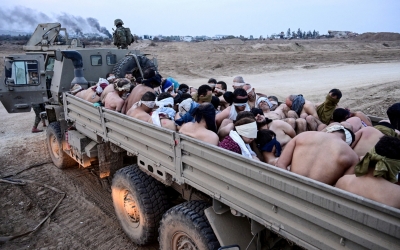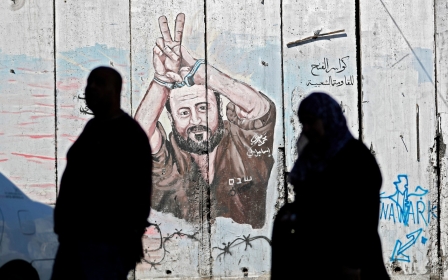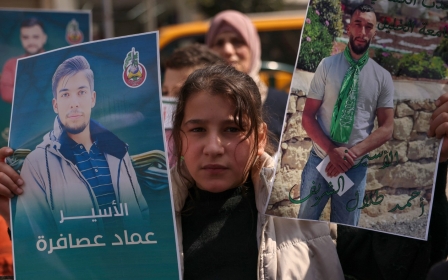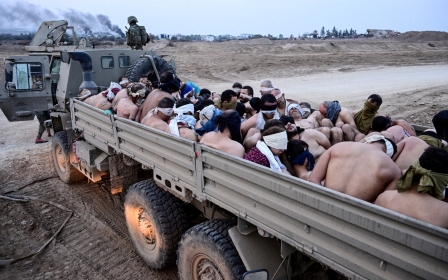Israel 'deliberately' targeting prominent Palestinian prisoners
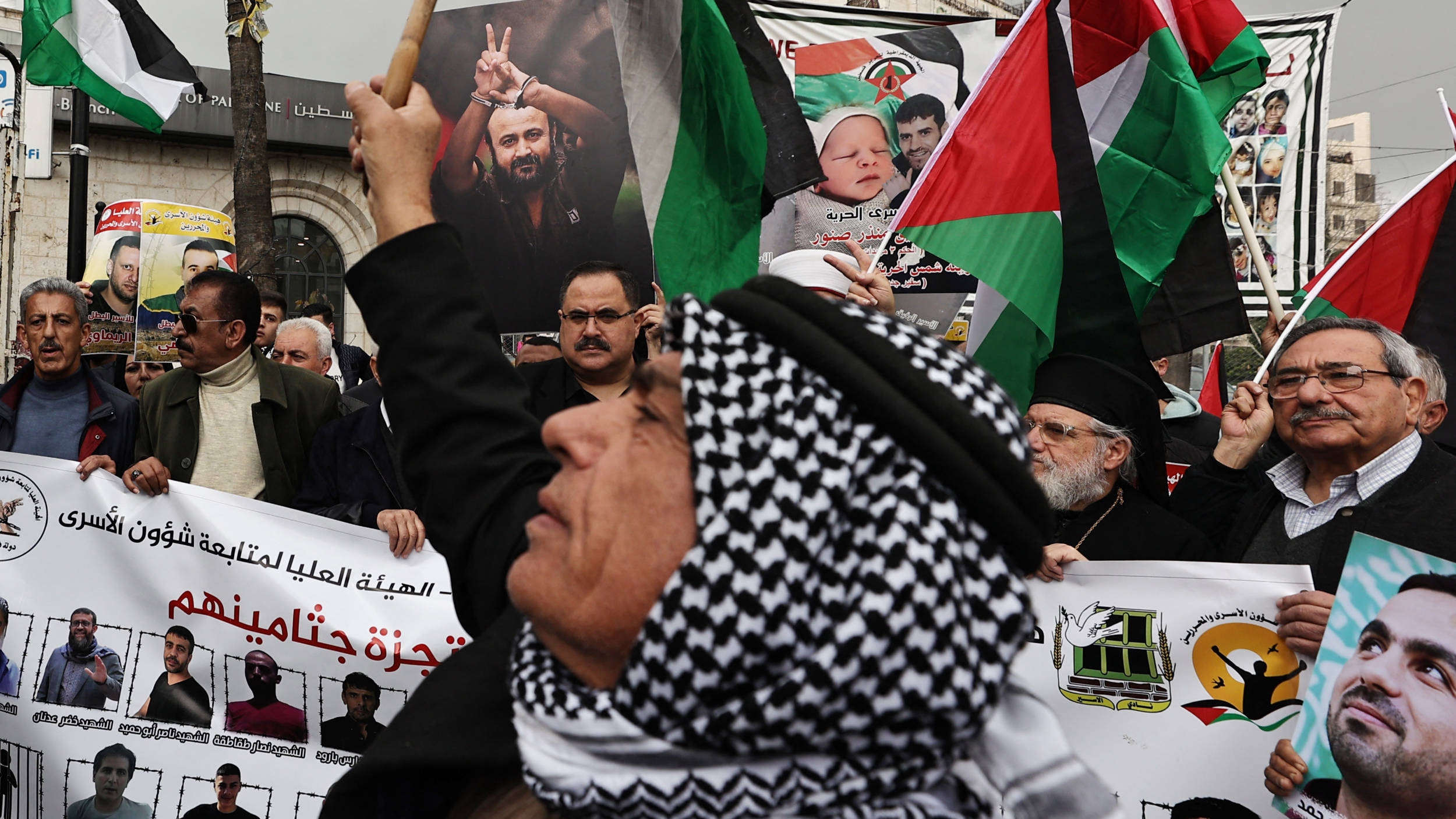
The family of Ibrahim Hamed, one of the longest-serving Palestinian prisoners in Israeli jails, recently received shocking news. Their son, 59, was beaten so brutally by Israeli guards that his whole body was covered in bruises.
The details were provided by a freed prisoner, Adeeb al-Samoudi, who had witnessed the beating in the notorious Gilboa prison.
This is not the first report of Israeli abuse and harassment against prominent prisoners to emerge in the past several months. Veteran prisoners like Nael Barghouti and Marwan Barghouti, who is at the head of Hamas's list of any potential prisoner exchange deal, have been subjected to physical abuse, humiliation and isolation.
Samoudi, from Jenin, was released last Thursday and transferred to hospital, suffering from the effects of torture and starvation.
In testimony given to Middle East Eye, Samoudi said Hamed was attacked on Wednesday.
New MEE newsletter: Jerusalem Dispatch
Sign up to get the latest insights and analysis on Israel-Palestine, alongside Turkey Unpacked and other MEE newsletters
"There is no place on his body that doesn’t have bruises, scratches or wounds. He bled heavily from his head and was unable to stand on his feet. His health condition is very serious," Samoudi said.
"No matter how much I try to describe his condition, I will not be able to. There is a great danger to his life due to the severity of the beating. He also lost consciousness several times."
Hamed, from the town of Silwad, east of Ramallah, was pursued by Israel for several years at the beginning of the Second Intifada, in the 2000s. He was described as Hamas’s mastermind in many armed operations.
Israel arrested Hamed in 2006 and sentenced him to life imprisonment 54 times, which is the second highest sentence ever given to Palestinian prisoners.
In 2004, Israel decided to deport his wife, Asma, to Jordan because she didn’t have a Palestinian ID. Neither she nor their two children have seen him since.
'We know nothing'
Ali, Hamed’s son, told MEE that there's great concern about his health condition, especially as Hamed suffers from herniated discs and is on several medications.
The family is seeking permission for their lawyer to visit Hamed, and is also preparing to submit a petition to the Israeli High Court of Justice if the request is rejected. The petition will also seek to bring in a private doctor to examine Hamed.
'There is no place on his body that doesn’t have bruises, scratches or wounds'
- Adeeb al-Samoudi, former prisoner
For a prisoner of Hamed's rank, a visit by a lawyer or doctor requires approval from the Shin Bet, Israel's internal security service. This has prompted the family to prepare to pursue the matter via legal channels.
"According to Samoudi’s description, we asked doctors about the seriousness of my father’s condition, but it is difficult to determine whether his head wound was internal or external," Ali said.
"If [it was] external, it should have been treated immediately with first aid, but we don’t know [if it was]."
At the end of February, the lawyer was able to visit Hamed while he was in Nafha prison and documented his testimony that the prison administration is deliberately abusing all prisoners and adopting a policy of starvation, which has caused Hamed to significantly lose weight, like all prisoners.
Hamed told his lawyers that all prisons, without exception, were subjected to a policy of punishment and the confiscation or destruction of possessions after 7 October.
Last week, the prison administration decided to transfer Hamed to Gilboa prison. With the lack of communication, and the lawyer prevented from visiting his client, the family has had no further information on whether Hamed was beaten again.
"We feel that we are in a state of unknown; we know nothing, no visits, no reassurance, no news and no answers to our many questions," Ali said.
Most leaders isolated
The crackdown on prominent prisoners has led to questions about Israel's intentions.
Qaddoura Fares, the head of the Palestinian Commission for Detainees and Ex-Prisoners’ Affairs, told MEE that Israel has been targeting Palestinian leaders in prison since long before 7 October, but the assaults have increased since the start of the war on Gaza.
Last March, Israeli guards brutally assaulted Marwan Barghouti, a member of the Fatah Central Committee, in Megiddo prison, leaving him with bruises and a bleed in one eye, Fares said.
Within a few months, Barghouti was beaten several times and transferred from one prison to another three times, according to Fares. He has been in solitary confinement since February.
Barghouti, who has been jailed by Israel since 2002, is one of the most popular Fatah figures in the West Bank and Gaza. A recent poll by the Palestinian Centre for Policy and Survey Research found that the 64-year-old would decisively win a presidential election against the 88-year-old Mahmoud Abbas.
Barghouti is currently serving a life sentence over his involvement in deadly armed resistance acts against Israel during the Second Intifada, which started in 2000.
Fares said the Israeli prison administration wants to punish prominent Palestinian prisoners, but also wants to avoid fatally harming them, to avoid escalating the situation across various regions.
"Most of the leaders in prison are in solitary confinement cells, and this is the greatest evidence that they are being targeted," he added.
A lawyer recently visited Barghouti and confirmed he is being subjected to the prison's policy of starvation and exhaustion. The lawyer said Barghouti has lost so much weight that he would barely be recognisable to his associates.
"Israel doesn't want its treatment of these leaders to appear intentional, otherwise perhaps it might have gone further than it had done so far," Fares said.
Beaten for hours
Families of Palestinian prisoners are following with great concern the testimonies of released detainees about what their sons are exposed to inside Israeli prisons.
The Israeli prison administration has isolated representatives of each Palestinian faction in solitary confinement cells after severely beating them.
'In one of the attacks, Nael Barghouti was beaten for three continuous hours in front of his nephew'
- Suhair Barghouti, sister-in-law
Various testimonies state that prison authorities would select the leaders from among the prisoners and assault them, especially targeting the head and other major body parts. The prisoners believe this is done with the intention of causing permanent injuries and memory loss.
Suhair Barghouti, the sister-in-law of prisoner Nael Barghouti, said the veteran prisoner has been systematically beaten several times.
Nael, 64, is considered an icon of Palestinian prisoners, having spent 44 years of his life in detention.
Last December, he was transferred from Ofer prison to Gilboa prison and was struck the entire way, with the beatings focused on the head, chest and sensitive areas.
The recent assaults have left him with broken ribs, and the inability to walk or move his hand, which may have been broken. But he was still denied medical treatment.
"In one of the attacks, he was beaten for three continuous hours in front of his nephew, Anad, who tried to take the blows on his behalf and protect him," Suhair said.
"Anad was also beaten in the face and eye, which swelled and continued to bleed for days."
Middle East Eye delivers independent and unrivalled coverage and analysis of the Middle East, North Africa and beyond. To learn more about republishing this content and the associated fees, please fill out this form. More about MEE can be found here.


